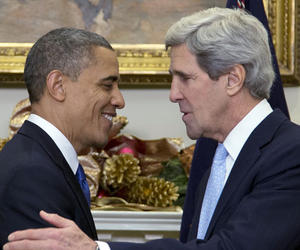John Kerry’s nomination as secretary of state raises hopes, fears over Cuba policy
- Submitted by: lena campos
- Politics and Government
- 12 / 23 / 2012

Sen. John Kerry has questioned U.S. pro-democracy spending in Cuba, and endorsed the embargo but favors liberal travel to the island.
Both hopes for and fears of significant changes in Cuba policies during President Barack Obama’s second term heightened Friday with the nomination of Sen. John Kerry as the next U.S. Secretary of State.
The Massachusetts Democrat in the past has endorsed the embargo but proposed allowing all travel to the island, including tourist trips, and criticized both Radio/TV Marti and the U.S. government’s pro-democracy programs in Cuba.
His nomination to succeed Hillary Clinton is expected to sail through Senate confirmation because Kerry has served in the Senate since 1984 and chairs the powerful Senate Committee on Foreign Relations.
Kerry’s long-telegraphed move to the State Department won applause from backers of the Obama administration’s policy of expanding ties and assistance to the Cuban people while waiting for the government to move toward democracy and human rights.
“The president’s positions on Cuba are clear, and he (Kerry) is a good pick to implement them,” said Joe Garcia, a Miami Democrat elected to Congress last month. “He’s a thoughtful, experienced foreign policy expert.”
New Jersey Sen. Bob Menendez, a Cuban-American Democrat who is likely to succeed Kerry as chairman of the foreign relations committee, favors strong sanctions on Cuba. He praised Kerry for his knowledge of foreign policy but did not mention his stands on Cuba.
“The high-level relationships that he has built with world leaders will allow him to step seamlessly into the position and to ensure that there is no decline in U.S. leadership on important global issues during a transition,” Menendez said.
Even Mauricio Claver-Carone, executive director of the pro-sanctions U.S.-Cuba Democracy Political Action Committee, described Kerry as “reasonable and willing to listen to all sides.”
During his first term Obama lifted almost all limits on Cuban-American travel and remittances to the island and reopened educational “people-to-people” visits by all U.S. residents, although tourism remains banned. Further openings were stalled by Cuba’s detention of Alan Gross, a Maryland man serving a15-year sentence in Havana on charges Washington views as spurious.
But Kerry’s impending move to the State Department also sparked fears among some Cuban-Americans that he will be too willing to seek accommodations with Havana and other repressive governments around the world.
“He comes from a mentality that can tolerate a dictatorship like Cuba’s but cannot tolerate that a (U.S.) person can’t travel to Cuba” because the U.S. government wants to deny tourist dollars to Havana, said Miami radio commentator Ninoska Perez Castellón.
Kerry backed the Freedom to Travel to Cuba Act, a 2009 bill that would have allowed unrestricted travel to Cuba, arguing that U.S. authorities should not limit the right of private citizens to travel anywhere. The bill was never voted on.
The senator also has been critical of the millions of dollars spent on the U.S. government’s Radio/TV Martí, complaining that the stations are badly run and that their biased programming has little or no impact on the island.
“After 18 years TV Martí still has no significant audience in Cuba. U.S. civil society programs may have noble objectives, but we need to examine whether we’re achieving them,” he wrote in a 2009 column on Cuba printed in the Tampa Bay Times.
Kerry took a direct hand in Cuba issues last year, when he put a “hold” on $20 million for the pro-democracy programs for two months in order to push for changes that would make them more efficient and less “provocative” to Cuba.
“There is no evidence that the ‘democracy promotion’ programs, which have cost the U.S. taxpayer more than $150 million so far, are helping the Cuban people,” Kerry said. “Nor have they achieved much more than provoking the Cuban government to arrest a U.S. government contractor.”
Gross was arrested in late 2009 for delivering sophisticated communications equipment to Cuba’s Jewish community under a democracy program funded by the U.S. Agency for International Development. The equipment would have allowed Internet access outside the control of the government’s telecommunications monopoly.
Kerry released his hold on the money after some of the programs were changed and Menendez stepped in to defend them. Claver-Carone said this week that a senior Democratic staffer on the Senate Foreign Relations Committee, and not Kerry, bore the main responsibility for the “hold.”
Miami radio commentator Max Lesnik, who calls Fidel Castro a friend and opposes all U.S. sanctions on Cuba, wrote Friday that if Kerry “does what he says … there will be no puppets left in the so-called ‘dissidence.’”
As the Democratic presidential candidate in 2004, Kerry endorsed the U.S. embargo but called the wet-foot, dry-foot policy, which allows Cubans who set foot on U.S. territory to stay, “uneven” because if does not apply to other nationalities.
The Center for Democracy in the Americas, which favors more engagement with Cuba, noted last week that Obama also may nominate former Sen. Chuck Hagel, a Nebraska Republican who favors lifting the U.S. embargo entirely, as Secretary of Defense.
If the two men are confirmed, the center wrote in an email, it will mean that “seasoned figures who urged the country to dump its Cold War baggage and normalize relations (with Cuba) would be at the table when critical strategic decisions are made.”
Source: Miami Herald
Comments